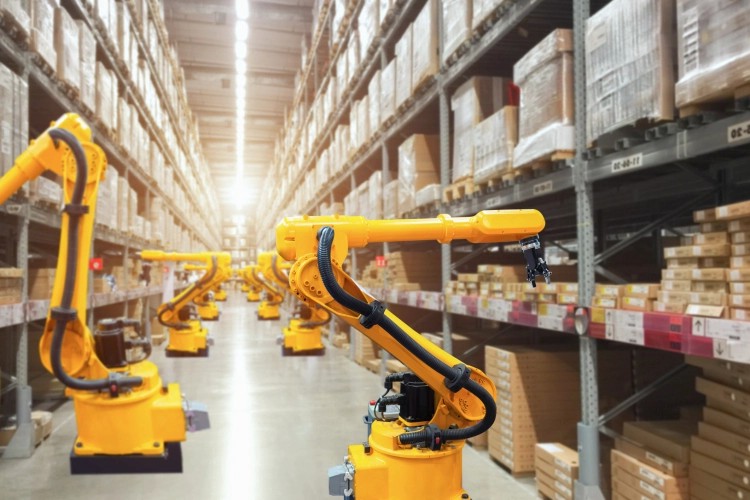
对工人们来说,自动化早已算不上什么新威胁。早在新冠疫情扰乱正常生产之前,许多高管就已经在改变企业组装产品的方式。除了制造业,其他行业也已经考虑效仿。
但如今,随着全球性危机挥之不去,蔓延的疫情可能会加速这一转变。
埃默里大学戈伊祖塔商学院(Emory University’s Goizueta Business School)的金融学副教授汤姆•史密斯说:“每每计划被扰乱,人们就会被迫做出决定。我会为此买单,这至少可以加快决策过程。当突然陷入危机时,聪明而富有创造力的人会找到解决方案。只要他们有办法,他们就不会放任危机毁掉一切。”
世界经济论坛(World Economic Forum)的数据显示,在美国,有近40%的工作面临“被自动化”的显著风险,超过10%的工作处于高风险之中。而其他几个国家的风险水平要更高。
从长期来看,员工们将就此去学习新的核心技能,如分析、批判性思维,增强创造力;但从短期来看,可能会困难重重——对于那些被迫无薪休假或临时下岗的人来说,这一方案可能并不受欢迎。
“人们应该做出的行为和人们实际做出的行为,是有区别的。”史密斯说,“公司曾经对员工负有责任,但现在已经不是这样了。工人是一次性的。一旦实现了自动化,公司对工人就没有任何责任了。我不是说这是对的,也代表这是道德的。这只是一个事实。一旦员工被解雇,公司就自认为没有任何责任来照顾他们,他们将会收到一张解雇通知书和一块蛋糕,仅此而已。”
当然,与技术的使用和设计有关的技能,将越来越凸显价值,比如自动化系统的设计就囊括其中。但是,全球疫情持续蔓延,导致工人们无法快速学习、领悟这些新知识,对工人们的威胁只会增加。
世界经济论坛表示:“数字技能不足,不仅阻碍了(信息和通信技术)的传播,还加剧了自动化带来的失业风险。在经济合作与发展组织(OECD)的27个国家中,有16个国家的数字技能得分在过去四年有所下降,使得工人们更加难以过渡到新的工作岗位中。”
不过自动化也不像一年前那么可怕了。新冠疫情让“机器负责”的好处得以凸显,人类可以专注于更重要的议题,更实现了社交距离保护。
但是,过去一年中人们所关注的一些社会问题并不能得到彻底消除。相反,在一些专家看来,有些问题可能更严重了。
“技术变革带来的生产力和效率收益将对社会产生积极影响,但这并不意味我们可以完全放松警惕。”布鲁金斯学会(Brookings Institution)经济研究项目的非常驻研究员马库斯•凯西上月在一篇博客文章中写道,“自动化和人工智能的进步有可能放大我们社会目前面临的诸多挑战,例如收入和财富不平等、企业权力集中、向上流动性下降,以及一直存在的残疾、性别和种族歧视等问题。”
疫情让一些行业迅速倒闭,许多公司因此或将更仔细地审视自己当下及未来几年的资本结构。许多高管正在考虑是否应该用自动化取代员工,这样一来,即便是一场新的流行病来袭,他们的公司就能够免于倒闭的风险。
“这样的经济混乱使许多公司有额外的助推力去重新审视他们开展业务的方式。”史密斯说,“毫无疑问,这种力量强而有力。我必须相信,这种经济动荡正使许多公司重新评估它们的生产过程。”
对员工们来说,也有一个好消息:自动化不是一时兴起、头脑一热就可以入局的东西。新冠疫情影响了许多公司的收入,而向自动化过渡需要大量的资金支出。从本质上说,公司需要从长远来看节省成本,即用一种费用替代另一种费用。
尽管自动化正在从制造业扩展到食品服务、杂货店和客服中心等各个领域,但在有些行业,员工们大可放心,他们不会被技术取代。
史密斯说:“如果你在一家实体酒吧工作,顾客来这里只是因为喜欢爆米花和酒保,在这种情况下,自动化反而会让酒吧生意无以为继。”(财富中文网)
编译:杨二一
对工人们来说,自动化早已算不上什么新威胁。早在新冠疫情扰乱正常生产之前,许多高管就已经在改变企业组装产品的方式。除了制造业,其他行业也已经考虑效仿。
但如今,随着全球性危机挥之不去,蔓延的疫情可能会加速这一转变。
埃默里大学戈伊祖塔商学院(Emory University’s Goizueta Business School)的金融学副教授汤姆•史密斯说:“每每计划被扰乱,人们就会被迫做出决定。我会为此买单,这至少可以加快决策过程。当突然陷入危机时,聪明而富有创造力的人会找到解决方案。只要他们有办法,他们就不会放任危机毁掉一切。”
世界经济论坛(World Economic Forum)的数据显示,在美国,有近40%的工作面临“被自动化”的显著风险,超过10%的工作处于高风险之中。而其他几个国家的风险水平要更高。
从长期来看,员工们将就此去学习新的核心技能,如分析、批判性思维,增强创造力;但从短期来看,可能会困难重重——对于那些被迫无薪休假或临时下岗的人来说,这一方案可能并不受欢迎。
“人们应该做出的行为和人们实际做出的行为,是有区别的。”史密斯说,“公司曾经对员工负有责任,但现在已经不是这样了。工人是一次性的。一旦实现了自动化,公司对工人就没有任何责任了。我不是说这是对的,也代表这是道德的。这只是一个事实。一旦员工被解雇,公司就自认为没有任何责任来照顾他们,他们将会收到一张解雇通知书和一块蛋糕,仅此而已。”
当然,与技术的使用和设计有关的技能,将越来越凸显价值,比如自动化系统的设计就囊括其中。但是,全球疫情持续蔓延,导致工人们无法快速学习、领悟这些新知识,对工人们的威胁只会增加。
世界经济论坛表示:“数字技能不足,不仅阻碍了(信息和通信技术)的传播,还加剧了自动化带来的失业风险。在经济合作与发展组织(OECD)的27个国家中,有16个国家的数字技能得分在过去四年有所下降,使得工人们更加难以过渡到新的工作岗位中。”
不过自动化也不像一年前那么可怕了。新冠疫情让“机器负责”的好处得以凸显,人类可以专注于更重要的议题,更实现了社交距离保护。
但是,过去一年中人们所关注的一些社会问题并不能得到彻底消除。相反,在一些专家看来,有些问题可能更严重了。
“技术变革带来的生产力和效率收益将对社会产生积极影响,但这并不意味我们可以完全放松警惕。”布鲁金斯学会(Brookings Institution)经济研究项目的非常驻研究员马库斯•凯西上月在一篇博客文章中写道,“自动化和人工智能的进步有可能放大我们社会目前面临的诸多挑战,例如收入和财富不平等、企业权力集中、向上流动性下降,以及一直存在的残疾、性别和种族歧视等问题。”
疫情让一些行业迅速倒闭,许多公司因此或将更仔细地审视自己当下及未来几年的资本结构。许多高管正在考虑是否应该用自动化取代员工,这样一来,即便是一场新的流行病来袭,他们的公司就能够免于倒闭的风险。
“这样的经济混乱使许多公司有额外的助推力去重新审视他们开展业务的方式。”史密斯说,“毫无疑问,这种力量强而有力。我必须相信,这种经济动荡正使许多公司重新评估它们的生产过程。”
对员工们来说,也有一个好消息:自动化不是一时兴起、头脑一热就可以入局的东西。新冠疫情影响了许多公司的收入,而向自动化过渡需要大量的资金支出。从本质上说,公司需要从长远来看节省成本,即用一种费用替代另一种费用。
尽管自动化正在从制造业扩展到食品服务、杂货店和客服中心等各个领域,但在有些行业,员工们大可放心,他们不会被技术取代。
史密斯说:“如果你在一家实体酒吧工作,顾客来这里只是因为喜欢爆米花和酒保,在这种情况下,自动化反而会让酒吧生意无以为继。”(财富中文网)
编译:杨二一
Automation is hardly a new threat to workers. Long before the arrival of COVID-19 disrupted businesses, many manufacturing executives were already changing how their companies assembled products, and other industries were considering following suit.
But as the global crisis has dragged on, the pandemic could be accelerating that shift.
“Every time there’s a disruption it forces people to make decisions,” says Tom Smith, an associate professor of finance at Emory University’s Goizueta Business School. “I would put money on the fact that this has sped up at least the decision-making process. When, all of a sudden, you’re in a crisis, smart and creative people find solutions. Creative people don’t let the crisis take everything down if they can help it.”
Just under 40% of U.S. jobs are at significant risk of being automated, according to the World Economic Forum (WEF). More than 10% of the country’s jobs are at high risk. Several other countries are at notably higher levels.
Long term, that could mean a workforce with new core skills, including analytical and critical thinking and enhanced creativity, but the short term could be a lot rockier—news that likely isn’t welcome to people who have already been furloughed or temporarily laid off.
“There’s a difference between how people behave and how they should behave,” says Smith. “Companies used to have responsibilities to their workers. That’s just not the case anymore. Workers are disposable. So, once you automate, you have zero responsibility to the workers. I’m not saying that’s right or the ethical thing, but companies just don’t feel they have any responsibility for their workers once they’ve been displaced. The truth is that workers are going to get a pink slip and a sheet cake.”
The most valuable skills, of course, will be tied to the use and design of technology, including those automation systems. But the public health crisis has disrupted an already slow uptake in those worldwide. That only increases the threat to workers.
“The lack of adequate digital skills not only hampers the diffusion of [information and communications technology] but also exacerbates the risk of job losses related to automation,” said the WEF. “In 16 of 27 OECD [Organization for Economic Cooperation and Development] countries, digital skills scores have declined over the past four years, making it more difficult for workers to transition to new roles.”
Automation isn’t as scary as it was a year ago. The pandemic has highlighted the advantages of delegating some responsibilities to machines, letting humans focus on more important issues and allowing for more social distancing.
It won’t, though, erase some of the societal problems that have come into focus in the past year—and, some experts warn, it could intensify them.
“The productivity and efficiency gains of technological change will be a net positive for society. However, this does not mean we have no reason for concern,” wrote Marcus Casey, a nonresident fellow in the economic studies program at the Brookings Institution in a blog post last month. “Advances in automation and A.I. have the potential to magnify many of the challenges currently facing our society: income and wealth inequality, concentration of corporate power, reduced upward mobility, and persistent disability, gender, and racial discrimination.”
Given how fast the pandemic shut down certain industries, many companies could be taking a much closer look at their capital structure—and what it’s going to look like in years to come. And the question on many executive minds is whether they should consider replacing employees with automation, if only so their company doesn’t have to shut down completely should another pandemic arise.
“When you have a disruption in the economy like this, it gives lots of corporations an extra nudge to reexamine how they go about doing business,” says Smith. “There’s no doubt that nudge has been a really strong rib breaker this time. I have to believe this economic disruption is causing lots of companies to reevaluate what their production process looks like.”
The good news for employees is that automation isn’t something that can be entered into on a whim. The coronavirus has impacted revenues at a wide swath of companies, and there’s a significant capital outlay to transitioning to an automated system. Companies, in essence, substitute one set of expenses for another, with an eye on the long-term savings.
And while automation is expanding beyond manufacturing to everything from food service to grocery stores to call centers, there are some businesses where the workers can rest fairly easy they won’t be replaced by technology.
“If you’re a brick-and-mortar bar, and people come because they like the popcorn and bartender, there’s no amount of automation that can keep that bar in business,” says Smith.






